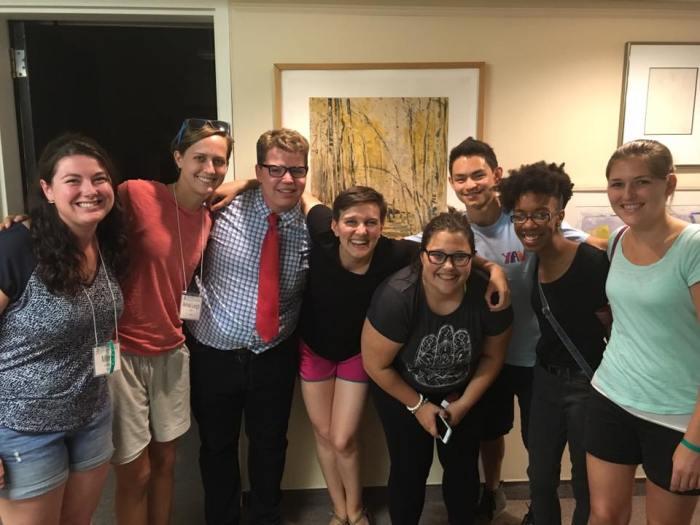“It’s nice that you are here. But we don’t need you.”
-Young Adult Volunteer Coordinator reflecting on his own YAV experience
Last week, we had a well-organized orientation that challenged us to start thinking about our work for the year. The quote above was from our program coordinator who reminded us that most of our sites don’t “need” us. We are not doing our work to save the world, nor can we do so in one year. But we are serving to help learn and to be served by those around us. We also discussed social justice issues such as racism and our personal roles in aiding or confronting those issues. For international YAVS, we also discussed our privilege as (mostly white) Americans in a foreign country.
One particular exercise had all of the volunteers split into two groups, volunteers who identify as white and volunteers who identify as people of color. Being a bi-racial person of privilege, I was torn about which group to join. I don’t face the challenges and struggles that many people of color deal with, but I also do not identify as only white. So I joined the persons of color group. I knew I made the right choice when we discussed how people of color have many different backgrounds, and are often mis-identified by others. You can’t put someone in a box solely based on the color of their skin. It was helpful to know that other people face this stereotyping issue.
However, I also noticed that I was the only male in that group. So I asked staff members if I was in fact the only male of color. They responded that I was not, there were others. However, those individuals chose to go with the volunteers who identified as white, and their decision should be respected.
Later in the week, an announcement was made about starting an affinity group for white males. The group’s purpose was to discuss how white males can (1) recognize the privilege given to them by society and (2) not allow that privilege to push other racial groups out of conversations and decisions. Being a bi-racial person of privilege who partially identifies as white, I attended. When I first walked into the room, I think some people were surprised to see me there, since I had not joined the group of volunteers who identify as white the day before. The first time I spoke, I gave an explanation of my racial background and acknowledged my privilege. I have every need to be held accountable to not use or allow my privilege to push other racial groups out of conversations. I knew I made the right choice when we discussed how hard it is to not fall into the roles that society has laid out for us, such as dominating conversations and always being “in charge.” Even in attempts to be inclusive by inviting other racial/ethnic groups to the table to discuss racial matters, we fail to recognize our privilege. True equality and true respect means that we allow people of other racial groups to set the table and invite us into the conversation. It was helpful to know that other white males recognize their privilege and are trying to confront it in their own lives as a first step in addressing racial issues.
As I begin my year in Korea, these topics play in the back of my mind. How does my privilege as an American manifest itself in ways that I do not recognize? How does it change the way people interact with me? And as a person with Asian features, how do Koreans react to me differently than other Americans? These questions tie in to the quote at the beginning of this post. Through this orientation, all of us YAVs recognize our privilege regardless of race. We also know that we are not “needed” to improve the communities we serve. But maybe we need these communities, and the opportunities this year presents to us, to improve our own understandings of ourselves.

Thoughtful and well-written.
LikeLike
Shall be watching for updates as this adventure unfolds. Thank you for your honest and thought provoking comments, Simon.
LikeLike